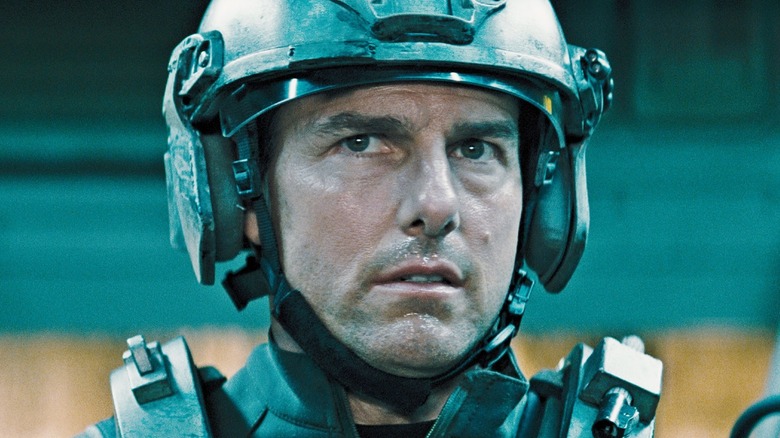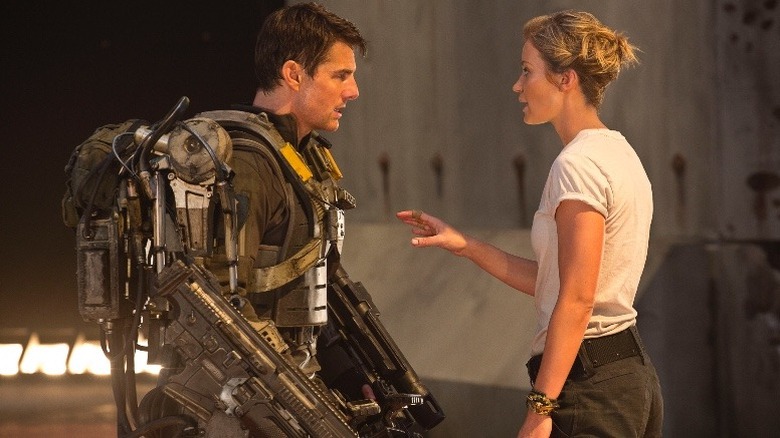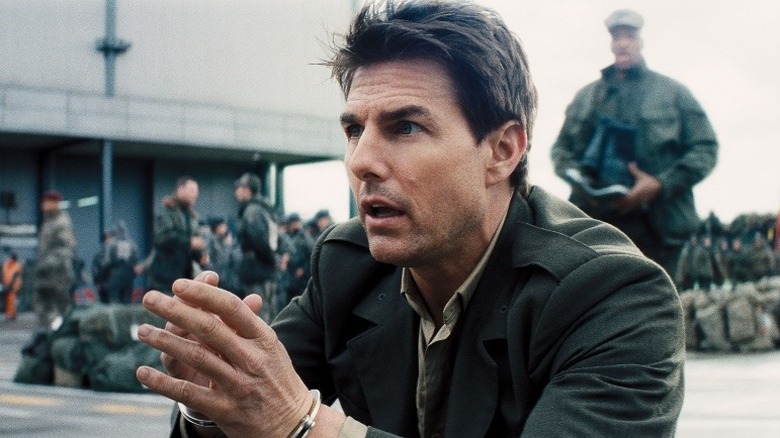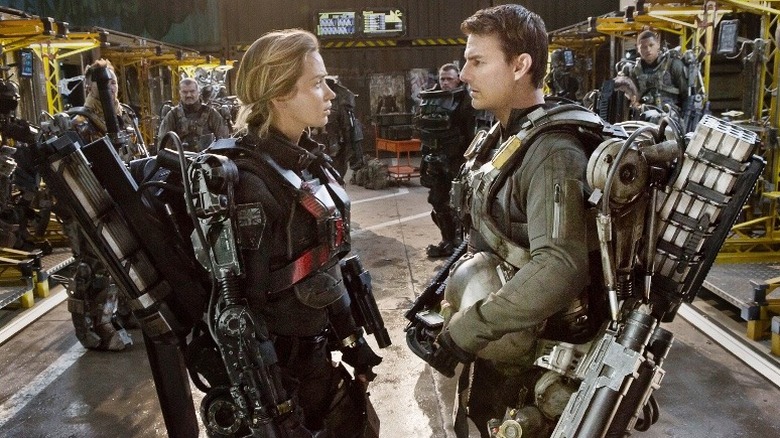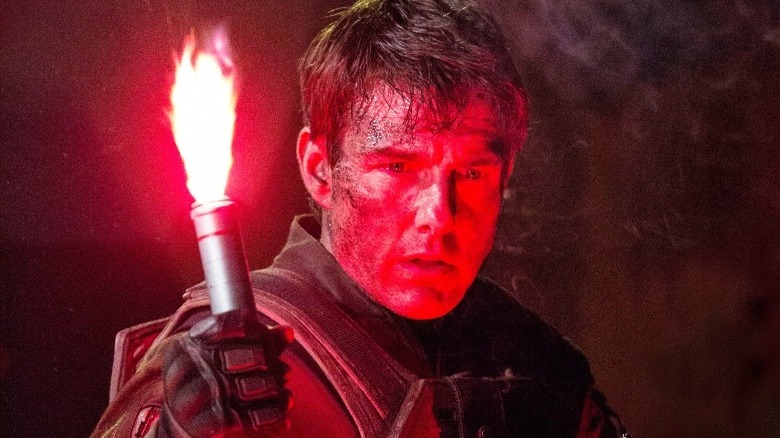Edge Of Tomorrow Ending Explained: Ready Player Tom Cruise
Audiences have grown accustomed to watching Tom Cruise risk life and limb for his movies, whether it requires him to swing around the outside of the tallest building in the world or belt Foreigner tunes to his co-star's butt. But as un-killable as Cruise seems to be in real-life (or thinks he is, anyway), he's got nothing on his character from 2014's "Edge of Tomorrow."
Directed by Doug Liman, the sci-fi thriller (a loose adaptation of the Japanese novel "All You Need Is Kill") takes place in an alternate 2020 that's somehow worse than the actual one, in which an army of aliens known as Mimics have crash-landed in Germany and quickly conquered much of Europe. Cruise stars as Major William Cage, a selfish PR officer with no real combat experience who's demoted and forced to participate in an invasion against the Mimics, only to find himself trapped in a time loop after being covered in the blood of an unusually large Mimic, and dying in battle.
Confounded about what's happening, Cage gets some clarity from Sgt. Rita Vrataski (Emily Blunt), a war hero who was formerly stuck in her own Mimic-induced time loop. For the most part, "Edge of Tomorrow" is pretty cohesive in the way it lays out the story's rules for time travel, at least until you get to the movie's somewhat baffling ending.
The Ending of Edge of Tomorrow
As Cage soon learns, the larger Mimics are known as Alphas and exist as part of a super-organism controlled by the Omega: a creature that resets the day when an Alpha is killed in combat, allowing the Mimics to keep re-fighting the same battle until they win. Rita, like Cage, discovered this after being exposed to an Alpha's blood, allowing her to tap into the Omega's power until she got a blood transfusion.
Much of "Edge of Tomorrow" consists of repeated scenes of Cage training and trying to find the Omega with Rita. This also necessitates Cage dying, over and over, allowing him to learn from his mistakes in the same way someone playing a video game has to keep tackling the same challenges until they can beat them without getting their avatar killed. Along the way, Cage grows more selfless and empathetic, much like Bill Murray's uncaring weatherman Phil Connors did in the classic time loop comedy "Groundhog Day."
Eventually, Cage and Rita do locate the Omega, only for Cage to lose his time-travel abilities after he suffers a severe injury and gets a life-saving blood transfusion before he can kill himself. As such, Cage seems to die permanently while sacrificing his life to kill the Omega before unexpectedly making contact with the creature's blood, sending him back not one, but two days to a reality where Cage was never demoted and humanity is winning the war against the Mimics.
Wait, What?
While critics and audiences mostly liked "Edge of Tomorrow" when it first came out, its ending left many perplexed, given the way it seemed to blatantly violate the film's established rules about the Omega's powers. As co-writer Christopher McQuarrie explained, the original plan was to end the movie on a darker note. However, as the film evolved and began to play up the comedy inherent to Cage getting killed time and time again, those plans had to change with it:
"... We really struggled to deliver what the movie needed to be emotionally. I know the ending was somewhat controversial, with some people who didn't like it, but I think the only way to make those people happy would to end the movie in a way that wasn't happy. We weren't interested in doing that. It needed to end in a way that wasn't harsh."
Shaky logic aside, the ending is satisfying when it comes to Cage's arc. At the start of "Edge of Tomorrow," Cruise's character is self-serving and hasn't done anything to earn the respect afforded to his ranking in the army. So, when soldiers snap to attention as he walks by in the movie's last scene, it feels like he actually deserves it. What's more, Cage is so happy to see Rita alive that he doesn't care that she no longer remembers him or what he did, cementing the idea that he's more concerned about people beyond himself and less fixated on personal glory.
So, About That Sequel...
Interestingly, McQuarrie has said "Edge of Tomorrow 2" will clear up all the questions about the first movie's ending ... if it ever happens. The sequel has been in the pipeline since 2015, based on an idea Cruise pitched to McQuarrie. Several rewrites later, the script is now apparently done, with Cruise, Blunt, and Liman all ready to return as soon as Warner Bros. says "Yes."
Therein lies the problem: "Edge of Tomorrow" grossed $370.5 million at the box office against a $178 million budget, which was enough to make it profitable (going by the old rule that a movie needs to gross double its budget in theaters to break even), but nowhere near enough to guarantee a sequel will happen. Not helping matters, Cruise and McQuarrie are still buried deep in the world of "Mission: Impossible," not to mention Cruise and Liman planning to shoot a movie in outer space (you read that right) at some point.
Blunt has admitted that scheduling is a big reason "Edge of Tomorrow 2" keeps getting postponed. The other factor, as Blunt noted, is the budget. In the Covid era, studios often only spend $150-$200 million on surefire bets, as far as their theatrical releases go. And unless everyone involved agrees to take a hefty pay cut, the odds are against Warner Bros. greenlighting "Edge of Tomorrow 2" as a Max exclusive.
Does Edge of Tomorrow Hold Up?
For all the questions its ending raises, "Edge of Tomorrow" works perfectly well as a standalone film. It presents the mythology of the Mimics with as few exposition dumps as possible, there are no attempts to set up sequels, and it recycles the tropes of the time loop sub-genre to tell a new story with a proper message. Compared to the modern landscape, where tentpoles that primarily exist to launch franchises reign supreme, "Edge of Tomorrow" is a breath of fresh air.
Not only that, the action in "Edge of Tomorrow" is genuinely inventive in the way it uses montages as visual shorthand for Cage cycling through his time loop over and over. The spectacle is equally captivating; as often as the movie plays Cage's injuries and deaths for darkly comedic effect, it also makes his pain tangible. You can't help but feel sorry for the schmuck and want to cheer him on, even if the whole situation is kinda his fault. Because of this, there's a real sense of stakes whenever Cage and Rita are in danger, more so than in a lot of recent blockbusters.
That's not to say "Edge of Tomorrow" is without its faults. Its conclusion is still nonsensical, and the quasi-romance between Cage and Rita falls flat, in part because Cruise and Blunt have zero onscreen romantic chemistry. Still, "Edge of Tomorrow" has only gotten better over time, much like a great video game with endless replay potential.
